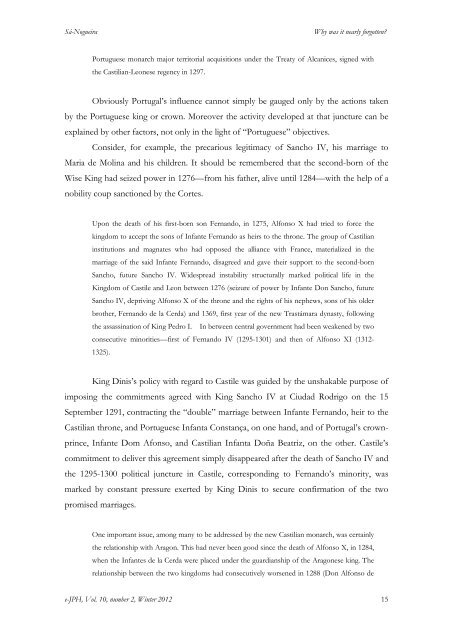Why was it nearly forgotten? The Agreda Treaty ... - Brown University
Why was it nearly forgotten? The Agreda Treaty ... - Brown University
Why was it nearly forgotten? The Agreda Treaty ... - Brown University
You also want an ePaper? Increase the reach of your titles
YUMPU automatically turns print PDFs into web optimized ePapers that Google loves.
Sá-Nogueira<br />
<strong>Why</strong> <strong>was</strong> <strong>it</strong> <strong>nearly</strong> <strong>forgotten</strong>?<br />
Portuguese monarch major terr<strong>it</strong>orial acquis<strong>it</strong>ions under the <strong>Treaty</strong> of Alcanices, signed w<strong>it</strong>h<br />
the Castilian-Leonese regency in 1297.<br />
Obviously Portugal’s influence cannot simply be gauged only by the actions taken<br />
by the Portuguese king or crown. Moreover the activ<strong>it</strong>y developed at that juncture can be<br />
explained by other factors, not only in the light of “Portuguese” objectives.<br />
Consider, for example, the precarious leg<strong>it</strong>imacy of Sancho IV, his marriage to<br />
Maria de Molina and his children. It should be remembered that the second-born of the<br />
Wise King had seized power in 1276—from his father, alive until 1284—w<strong>it</strong>h the help of a<br />
nobil<strong>it</strong>y coup sanctioned by the Cortes.<br />
Upon the death of his first-born son Fernando, in 1275, Alfonso X had tried to force the<br />
kingdom to accept the sons of Infante Fernando as heirs to the throne. <strong>The</strong> group of Castilian<br />
inst<strong>it</strong>utions and magnates who had opposed the alliance w<strong>it</strong>h France, materialized in the<br />
marriage of the said Infante Fernando, disagreed and gave their support to the second-born<br />
Sancho, future Sancho IV. Widespread instabil<strong>it</strong>y structurally marked pol<strong>it</strong>ical life in the<br />
Kingdom of Castile and Leon between 1276 (seizure of power by Infante Don Sancho, future<br />
Sancho IV, depriving Alfonso X of the throne and the rights of his nephews, sons of his older<br />
brother, Fernando de la Cerda) and 1369, first year of the new Trastámara dynasty, following<br />
the assassination of King Pedro I. In between central government had been weakened by two<br />
consecutive minor<strong>it</strong>ies—first of Fernando IV (1295-1301) and then of Alfonso XI (1312-<br />
1325).<br />
King Dinis’s policy w<strong>it</strong>h regard to Castile <strong>was</strong> guided by the unshakable purpose of<br />
imposing the comm<strong>it</strong>ments agreed w<strong>it</strong>h King Sancho IV at Ciudad Rodrigo on the 15<br />
September 1291, contracting the “double” marriage between Infante Fernando, heir to the<br />
Castilian throne, and Portuguese Infanta Constança, on one hand, and of Portugal’s crownprince,<br />
Infante Dom Afonso, and Castilian Infanta Doña Beatriz, on the other. Castile’s<br />
comm<strong>it</strong>ment to deliver this agreement simply disappeared after the death of Sancho IV and<br />
the 1295-1300 pol<strong>it</strong>ical juncture in Castile, corresponding to Fernando’s minor<strong>it</strong>y, <strong>was</strong><br />
marked by constant pressure exerted by King Dinis to secure confirmation of the two<br />
promised marriages.<br />
One important issue, among many to be addressed by the new Castilian monarch, <strong>was</strong> certainly<br />
the relationship w<strong>it</strong>h Aragon. This had never been good since the death of Alfonso X, in 1284,<br />
when the Infantes de la Cerda were placed under the guardianship of the Aragonese king. <strong>The</strong><br />
relationship between the two kingdoms had consecutively worsened in 1288 (Don Alfonso de<br />
e-JPH, Vol. 10, number 2, Winter 2012 15
















